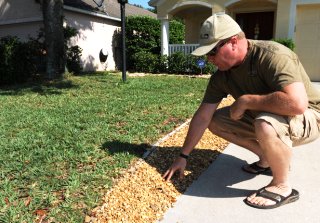|
Article
Courtesy of Herald Tribune By Sabrina
Rocco Published May
5, 2014
LAKEWOOD RANCH -- Three years ago, Michael Groves
replaced a sliver of grass in his front yard with a gravel path so his teenage
stepson could safely make it up and down the driveway.
Ben, 15, isn't your average high-schooler.
Ben was diagnosed with autism at age 5 and developed epilepsy in his preteen
years. He can have multiple seizures per month, requiring him to wear a $250
helmet at almost all times in case he collapses.
Ben plays with remote control cars in the
front lawn of his Summerfield home. If he walks down to the
sidewalk, he uses a path made of pea gravel and sand, according
to his father, who said his son knows never to step foot on the
concrete driveway. If Ben collapsed there, he could crack his
head open or even die.
Now the Summerfield/Riverwalk Village Association has decided to
oppose the 3-year-old path, stating it violates association
rules and design standards set forth in a declaration of
covenants.
Groves, who has lived in Summerfield since 2001, attended a
board meeting April 16 after he was told to replace the path
with concrete material such as pavers. The next day he received
a letter: "The SRVA board of directors met and denied your
request to be granted a variance to keep the rock driveway
extension to the left of the driveway." |
|
Mike Groves
shows an addition he has made to his driveway at his home in Lakewood
Ranch to help cushion any potential fall by his 15-year-old stepson with
autism and epilepsy. Lakewood Ranch board members are asking that Groves
change the addition to conform to the neighborhood rules. Groves
maintains that they are violating the Federal Fair Housing Act.
|
Groves said he is upset the board would not accommodate a
child with disabilities.
"If Ben has a seizure, if I had concrete here now, the ability for him to have a
more substantial head injury is actually a lot greater," said Groves, a spinal
and cranium specialist for a medical device company. "Because he has so many
seizures, we have to do everything we can to protect his
head. He goes straight down."
The pea gravel, Groves says, will disperse the energy of a fall better than
concrete.
He demonstrated by dropping a pebble into the gravel, which spread out upon
impact, cushioning the pebble's fall.
Groves, 40, claims the association is violating the federal Fair Housing Act,
which states a person with a disability can make "reasonable modifications" to a
property in order to "fully enjoy" the premises.
The gravel path, Groves says, is a reasonable modification. He wrote to the U.S.
Department of Housing and Urban Development and received a response April 18
stating the agency would consider an investigation.
Spokeswoman Elena Gaona said HUD could not determine whether the association is
violating the act prior to an investigation.
HUD's office of Fair Housing and Equal Opportunity will conduct the
investigation "using interviews of the parties and potential witnesses and
review of the relevant documents," Gaona wrote in an email to the Herald.
If the investigation proves the association wrong, SRVA could face a charge in
federal court, she added.
Robert Swiatek, association president, would not comment on the case Tuesday.
Stephen Thompson, an attorney hired by the association, said the board will meet
soon to discuss the decision.
Thompson contends Groves did not mention his son's disability in his initial
request.
"We have contacted Mr. Groves and informed him that the association is not
currently taking any enforcement action requiring him to remove the gravel
pathway that he has constructed on his property," Thompson said in an email to
the Herald on Tuesday. "We are in the process of reviewing the facts and
additional information that has recently been provided by Mr. Groves."
Groves said he provided a copy of his son's medical records to the association
Monday.
Dr. Selim Benbadis, professor and director of the Comprehensive Epilepsy Program
at the University of South Florida, said it is not uncommon for parents to take
all precautions possible to protect an epileptic child.
"Usually in severe types of seizures, the child will fall and sustain injury.
They can hit their face, they can hit their head, their nose and suffer severe
injuries," he said. "It is entirely reasonable to try to accommodate the house
inside and outside to avoid potential injury."
Groves and his wife, Laura, Ben's mother, padded the inside of their home in
dangerous areas. Ben's room has cushioned carpeting.
"I did this in good taste, and I did it to match the color of my house," Groves
said, pointing to the gravel path. "I've had it for three years. This is what
Ben knows." |
